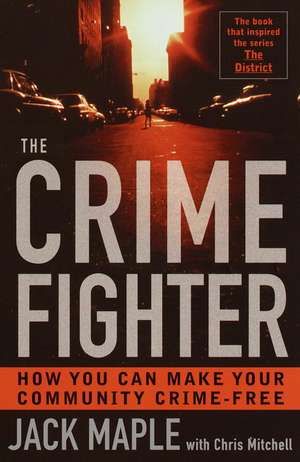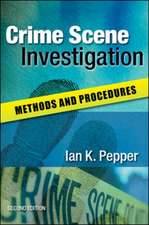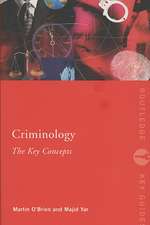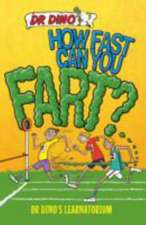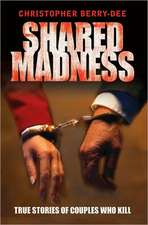The Crime Fighter: How You Can Make Your Community Crime Free
Autor Jack Maple Chris Mitchellen Limba Engleză Paperback – 30 sep 2000
But Maple is not satisfied. In The Crime Fighter, he shows how crime can be attacked all across America. Laced with fascinating, incredible, and often very funny tales of Maple's adventures as a cop, the book is as entertaining as it is informative. Anyone interested in how criminals think and act, and how the police should do their jobs, will devour this absorbing book.
Preț: 108.50 lei
Nou
Puncte Express: 163
Preț estimativ în valută:
20.76€ • 21.60$ • 17.14£
20.76€ • 21.60$ • 17.14£
Carte disponibilă
Livrare economică 22 martie-05 aprilie
Preluare comenzi: 021 569.72.76
Specificații
ISBN-13: 9780767905541
ISBN-10: 0767905547
Pagini: 272
Dimensiuni: 140 x 213 x 18 mm
Greutate: 0.27 kg
Editura: BROADWAY BOOKS
ISBN-10: 0767905547
Pagini: 272
Dimensiuni: 140 x 213 x 18 mm
Greutate: 0.27 kg
Editura: BROADWAY BOOKS
Notă biografică
Jack Maple began his career as a New York City Transit Patrolman and rose to become Deputy Commissioner of the NYPD. Since leaving the department, he has served as a consultant to police departments worldwide. He lives in New York City.
Chris Mitchell, a writer and reporter, lives in Brooklyn with his wife and daughter.
From the Hardcover edition.
Chris Mitchell, a writer and reporter, lives in Brooklyn with his wife and daughter.
From the Hardcover edition.
Extras
It Ain't Over Till the Fat Man's Thin
The guy in the suit couldn't have seen what was coming. He was slumped against a wall at the top of a subway staircase at 47th and Broadway, his eyes closed, his tie and collar open, a cardboard party hat fixed with an elastic at the top of his forehead and a gold medallion of some kind draped outside his shirt.
The noise of the crowd that night could have lulled any drunken head into a stupor, and that's what looked like had happened here: This George McFly type wasn't hearing the party horns or the noisemakers anymore, the clap-clapping of hoofs on pavement as mounted patrolled the barriers, or even the icy splash of another champagne bottle or wine cooler shattering on the street. He had been swallowed whole by one of the world's most notorious celebrations and was about to be awakened, minutes before the big ball dropped, by a sudden sting at the back of his neck.
I started moving toward him--invisible, but with my eyes locked on another man. This one had been eyeing the drunk for several minutes, and he was suddenly surging toward his mark with one hand out and the other hidden underneath his coat. That hidden hand was the reason for alarm, but it kept quiet when the free hand shot out and grabbed the chain, so I waited until the chain's new owner turned and came a couple steps across the sidewalk before I threw my open fist at the spot where the hidden hand had been and hit the thief broadside with my right shoulder.
He was built more like a fullback than I'd expected, but I kept driving with my legs the way the high school coaches had taught me, and he fell to the curb under me just as my fingers concluded that only a layer or two of clothing separated them from a familiar casting of steel.
"Gun!" I yelled.
The shouts of the crowd now turned to screaming as the crook and I rolled around in horseshit and confetti underneath their churning feet. A second crook was already on top of me, and my own pistol was starting to slide up out my waistband into his grasp when Carol Sciannameo jumped onto the pile and pinned my gun against me.
The rest of my crew converged from all sides--Vertel Martin, Richie Doran, Julie Ewbanks, Billy Carter, Joe Quirke, Jeff Aiello, Liz Sheridan, Ronnie Pellechia; Jimmy Nuciforo dropped a party horn to pull another lookout down into the manure. In an instant, all three crooks lay prone in the gutter, and the storm of hoofs bearing in on us came from a world moving at a slower speed.
"Put away your guns," I told my guys. "Get out your badges and your colors."
The spit of the horses sprayed us as their bridles spun them backward in front of us, their riders trying to blink disbelief out of their eyes. We didn't look, I'm sure, like most of the cops they knew.
My gray sable hat had come off in the tussle, so as I got to my feet, I felt for the first time the night's cold breath on my almost barren scalp. There was straw stuck in the tangle of my three-inch beard and clinging to my black zip-front sweater, which wrapped a wreath of white Playboy bunny heads just above my waist. Among those who appreciated crookwear, that sweater was the bomb, and I had the matching Playboy bunny shoes to go with it. In our crew, only Officer Jerry Lyons had clearly outdressed me that night, and he had played the role of the drunk vic in the suit, the party hat, and the gold chain.
Our merry band vanished as quickly as we had materialized, leading the three prisoners downstairs through a locked gate into an empty subway station and then down to the district for processing. The Mole People had made a good catch, but if we had paused a moment to take a last look around at the scene we'd left up on the street, we might have realized that our profession was being handed another humiliating defeat.
It was minutes before midnight, exactly fifteen years before the end of the "American Century," and Times Square, the scene of so many great victory parties across those hundred years, belonged to New York's crooks. Our team had cut short the night of one wolf pack, but there were scores more still snaking through the crowds in their sheepskin coats and Elmer Fudd hats, many of them wearing rings, medallions, and other trophies from crimes past, and some so bold that they couldn't be bothered to hide their foremost thought. "Snatch gold, snatch gold," they'd be hissing. When the ball fell at Times Square, it was like the starter's gun going off. How many pockets would be dug, how many bags snatched, how many windpipes throttled by a well-placed forearm before we all came back in a year to start the count all over again?
Over those next twelve months, the U.S. casualties of crime would come in faster than in any of the years when the news ticker at One Times Square was darkening the streets below with grim reports from the war in Vietnam. Nationwide, murders would leap 10 percent that year to 19,250. More than 500,000 robberies would be committed and almost 800,000 aggravated assaults. Seventy-eight cops would be killed in the line of duty.
And that was only 1986. Crime in America would get far worse before it ever got better.
If you were to return to the corner of 47th and Broadway in 1999, you might be stunned by the change in atmosphere. A gargantuan bas-relief of a Coke bottle still looms directly overhead, but that ad is now affixed to the Renaissance Hotel, one of a half-dozen family-friendly lodging places built at the "Crossroads of the World" in the years since. At one corner of the intersection, mitten-clad theatergoers push the Disney musical Beauty and the Beast--now in its sixth smash season!--to new box office records every night. At another, young tourists sip Starbucks coffee behind a plate-glass window while stock prices sprint past overhead on the towering headquarters of one of the world's largest financial services companies. Twenty paces away, a Planet Hollywood Hotel is rising out of the ground next to a billboard with a giant message paid for by John Lennon's widow. war is over read its big black letters.
If people didn't know Yoko Ono better, they might think she was adding her dog-whistle soprano to a national chorus of voices claiming the transformation of Times Square as evidence of a sweeping national victory over crime.
The cops in New York deserve all the accolades they get, and more. In 1993, 1,946 men, women, and children were murdered in New York City; in 1998, the toll stopped at 629. That same year there were about 280,000 fewer victims of serious crimes in the city than there had been five years earlier. While the rest of the country experienced a 23 percent decline in murder over that period, New York's results were three times as good.
But America is like the 600-pound man who's lost 200 pounds. If you've only known him five years, he looks great. If you haven't seen him since 1961, you're amazed at what a fat slob he's become. Today, violent crime--murder, rape, robbery, and aggravated assault--is still being committed at a rate three and a half times higher than it was the year John F. Kennedy was sworn in. Nearly 10,000 more people are murdered in the United States each year than in 1961, and that's despite almost four decades of advances in emergency room medical care. New York City, meanwhile, can't afford to snicker. After five years of intense dieting, its violent crime rate is still double the bloated national figure.
Some of the citizens of this country, unfortunately, take the brunt of the violence. Among black males ages eighteen to twenty-four, the murder victimization rate is about 20 times the national rate, and about nine times that among white males in the same age group. If the sons of senators, congressmen, judges, criminologists, and journalists were dying at that rate, we wouldn't be celebrating any victories over crime just yet. We'd be talking about mandatory conscription for the war raging in our streets.
The truth is, we as a nation have only turned back the clock on violent crime to 1985, the year that ended for me with a roll in the horse manure with two crooks and a couple of loaded guns.
I know we can do better. If the cops of America are given a plan--and worthy leaders--they can make even 1961 look like the bad old days.
It's time to go for the win.
The guy in the suit couldn't have seen what was coming. He was slumped against a wall at the top of a subway staircase at 47th and Broadway, his eyes closed, his tie and collar open, a cardboard party hat fixed with an elastic at the top of his forehead and a gold medallion of some kind draped outside his shirt.
The noise of the crowd that night could have lulled any drunken head into a stupor, and that's what looked like had happened here: This George McFly type wasn't hearing the party horns or the noisemakers anymore, the clap-clapping of hoofs on pavement as mounted patrolled the barriers, or even the icy splash of another champagne bottle or wine cooler shattering on the street. He had been swallowed whole by one of the world's most notorious celebrations and was about to be awakened, minutes before the big ball dropped, by a sudden sting at the back of his neck.
I started moving toward him--invisible, but with my eyes locked on another man. This one had been eyeing the drunk for several minutes, and he was suddenly surging toward his mark with one hand out and the other hidden underneath his coat. That hidden hand was the reason for alarm, but it kept quiet when the free hand shot out and grabbed the chain, so I waited until the chain's new owner turned and came a couple steps across the sidewalk before I threw my open fist at the spot where the hidden hand had been and hit the thief broadside with my right shoulder.
He was built more like a fullback than I'd expected, but I kept driving with my legs the way the high school coaches had taught me, and he fell to the curb under me just as my fingers concluded that only a layer or two of clothing separated them from a familiar casting of steel.
"Gun!" I yelled.
The shouts of the crowd now turned to screaming as the crook and I rolled around in horseshit and confetti underneath their churning feet. A second crook was already on top of me, and my own pistol was starting to slide up out my waistband into his grasp when Carol Sciannameo jumped onto the pile and pinned my gun against me.
The rest of my crew converged from all sides--Vertel Martin, Richie Doran, Julie Ewbanks, Billy Carter, Joe Quirke, Jeff Aiello, Liz Sheridan, Ronnie Pellechia; Jimmy Nuciforo dropped a party horn to pull another lookout down into the manure. In an instant, all three crooks lay prone in the gutter, and the storm of hoofs bearing in on us came from a world moving at a slower speed.
"Put away your guns," I told my guys. "Get out your badges and your colors."
The spit of the horses sprayed us as their bridles spun them backward in front of us, their riders trying to blink disbelief out of their eyes. We didn't look, I'm sure, like most of the cops they knew.
My gray sable hat had come off in the tussle, so as I got to my feet, I felt for the first time the night's cold breath on my almost barren scalp. There was straw stuck in the tangle of my three-inch beard and clinging to my black zip-front sweater, which wrapped a wreath of white Playboy bunny heads just above my waist. Among those who appreciated crookwear, that sweater was the bomb, and I had the matching Playboy bunny shoes to go with it. In our crew, only Officer Jerry Lyons had clearly outdressed me that night, and he had played the role of the drunk vic in the suit, the party hat, and the gold chain.
Our merry band vanished as quickly as we had materialized, leading the three prisoners downstairs through a locked gate into an empty subway station and then down to the district for processing. The Mole People had made a good catch, but if we had paused a moment to take a last look around at the scene we'd left up on the street, we might have realized that our profession was being handed another humiliating defeat.
It was minutes before midnight, exactly fifteen years before the end of the "American Century," and Times Square, the scene of so many great victory parties across those hundred years, belonged to New York's crooks. Our team had cut short the night of one wolf pack, but there were scores more still snaking through the crowds in their sheepskin coats and Elmer Fudd hats, many of them wearing rings, medallions, and other trophies from crimes past, and some so bold that they couldn't be bothered to hide their foremost thought. "Snatch gold, snatch gold," they'd be hissing. When the ball fell at Times Square, it was like the starter's gun going off. How many pockets would be dug, how many bags snatched, how many windpipes throttled by a well-placed forearm before we all came back in a year to start the count all over again?
Over those next twelve months, the U.S. casualties of crime would come in faster than in any of the years when the news ticker at One Times Square was darkening the streets below with grim reports from the war in Vietnam. Nationwide, murders would leap 10 percent that year to 19,250. More than 500,000 robberies would be committed and almost 800,000 aggravated assaults. Seventy-eight cops would be killed in the line of duty.
And that was only 1986. Crime in America would get far worse before it ever got better.
If you were to return to the corner of 47th and Broadway in 1999, you might be stunned by the change in atmosphere. A gargantuan bas-relief of a Coke bottle still looms directly overhead, but that ad is now affixed to the Renaissance Hotel, one of a half-dozen family-friendly lodging places built at the "Crossroads of the World" in the years since. At one corner of the intersection, mitten-clad theatergoers push the Disney musical Beauty and the Beast--now in its sixth smash season!--to new box office records every night. At another, young tourists sip Starbucks coffee behind a plate-glass window while stock prices sprint past overhead on the towering headquarters of one of the world's largest financial services companies. Twenty paces away, a Planet Hollywood Hotel is rising out of the ground next to a billboard with a giant message paid for by John Lennon's widow. war is over read its big black letters.
If people didn't know Yoko Ono better, they might think she was adding her dog-whistle soprano to a national chorus of voices claiming the transformation of Times Square as evidence of a sweeping national victory over crime.
The cops in New York deserve all the accolades they get, and more. In 1993, 1,946 men, women, and children were murdered in New York City; in 1998, the toll stopped at 629. That same year there were about 280,000 fewer victims of serious crimes in the city than there had been five years earlier. While the rest of the country experienced a 23 percent decline in murder over that period, New York's results were three times as good.
But America is like the 600-pound man who's lost 200 pounds. If you've only known him five years, he looks great. If you haven't seen him since 1961, you're amazed at what a fat slob he's become. Today, violent crime--murder, rape, robbery, and aggravated assault--is still being committed at a rate three and a half times higher than it was the year John F. Kennedy was sworn in. Nearly 10,000 more people are murdered in the United States each year than in 1961, and that's despite almost four decades of advances in emergency room medical care. New York City, meanwhile, can't afford to snicker. After five years of intense dieting, its violent crime rate is still double the bloated national figure.
Some of the citizens of this country, unfortunately, take the brunt of the violence. Among black males ages eighteen to twenty-four, the murder victimization rate is about 20 times the national rate, and about nine times that among white males in the same age group. If the sons of senators, congressmen, judges, criminologists, and journalists were dying at that rate, we wouldn't be celebrating any victories over crime just yet. We'd be talking about mandatory conscription for the war raging in our streets.
The truth is, we as a nation have only turned back the clock on violent crime to 1985, the year that ended for me with a roll in the horse manure with two crooks and a couple of loaded guns.
I know we can do better. If the cops of America are given a plan--and worthy leaders--they can make even 1961 look like the bad old days.
It's time to go for the win.
Recenzii
"Maple will leave you cheering as he scores victories over hack police brass, cheap politicians, and most importantly for the rest of us, himself. Book him."
-- Dennis Hamill, New York Daily News Columnist, Author of Three Quarters and Throwing 7's
"Cops and crooks--nobody knows them better than Jack Maple; and nobody has ever told their story quite like the 'Jackster.' He's been where the truth is stranger than fiction, and The Crime Fighter puts you right beside him."
-- William J. Bratton, Former New York City Police Commissioner
"Jack Maple is the people's cop. He has spent his life making all our lives safer. It's all in this book. A great read and a manual for policing in the new millennium."
-- Terry George and Jim Sheridan, Writers/Directors In the Name of the Father, Some Mother's Son, The Boxer
"Jack Maple is this country's outstanding thinker about fighting crime in our cities. Anyone concerned with making our cities safer should read this very important, very practical, and very witty book."
-- John F. Timoney, Police Commissioner,Philadelphia Police Department
-- Dennis Hamill, New York Daily News Columnist, Author of Three Quarters and Throwing 7's
"Cops and crooks--nobody knows them better than Jack Maple; and nobody has ever told their story quite like the 'Jackster.' He's been where the truth is stranger than fiction, and The Crime Fighter puts you right beside him."
-- William J. Bratton, Former New York City Police Commissioner
"Jack Maple is the people's cop. He has spent his life making all our lives safer. It's all in this book. A great read and a manual for policing in the new millennium."
-- Terry George and Jim Sheridan, Writers/Directors In the Name of the Father, Some Mother's Son, The Boxer
"Jack Maple is this country's outstanding thinker about fighting crime in our cities. Anyone concerned with making our cities safer should read this very important, very practical, and very witty book."
-- John F. Timoney, Police Commissioner,Philadelphia Police Department
Descriere
The architect of New York City's incredibly successful campaign to reduce crime lays out in colorful detail how to catch crooks and prevent crime.
